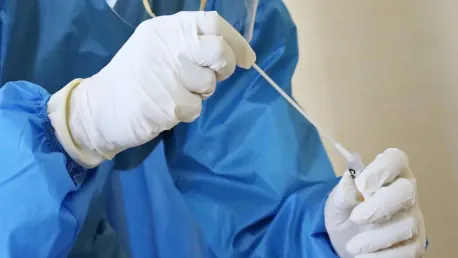Singapore is pioneering an innovative approach to Covid-19 research through human challenge studies, where volunteers are deliberately infected with the virus in controlled settings. This approach contrasts with traditional methods where infections occur naturally, allowing researchers to obtain faster and more accurate insights crucial for vaccine and therapy development. These studies play a vital role in understanding persistent infections despite vaccinations and could set a precedent for future infectious disease preparedness. The importance of quickly adapting new treatments and vaccines underlines the necessity of these human challenge studies.
Inception of the Sing-CoV Study
The National Centre for Infectious Diseases (NCID) in Singapore is conducting the Sing-CoV study with a clear objective: to enroll 20 healthy, vaccinated individuals between the ages of 21 and 30 by September or October for year-long monitoring. One of the primary goals of the study is to understand why Covid-19 infections persist despite vaccinations and prior infections. Equally important is the establishment of a robust framework for future human challenge studies, which could significantly impact how quickly and efficiently new treatments and vaccines are developed in response to emerging infectious diseases.
Human challenge studies like Sing-CoV are essential for bolstering Singapore’s readiness and response to potential outbreaks, including hypothetical future pandemics such as “Disease X.” Adding human challenge studies to Singapore’s arsenal of research tools addresses the urgent need for rapid and effective responses to infectious disease threats. Professor Vernon Lee, the incoming CEO of the Communicable Diseases Agency (CDA), emphasizes the unique advantage these studies provide in proactive health defense strategies. By deliberately infecting volunteers in a controlled setting, researchers can bypass the unpredictability of natural infection and study the virus’s behavior more precisely.
Accelerating Vaccine and Treatment Development
Human challenge studies are invaluable for quickly and cost-effectively screening potential vaccines and treatments, requiring fewer participants to yield reliable results. This efficiency allows promising findings to advance rapidly to larger clinical trials if the outcomes show potential. Associate Professor Barnaby Young, the principal investigator for Sing-CoV, emphasizes the significant advantages of such a framework for developing next-generation vaccines that not only prevent severe illness but also inhibit virus transmission. Such advances could have a profound impact on how global health crises are managed in the future.
Singapore’s involvement in the global Mucosal Immunity in Human Coronavirus Challenge (MUSICC) study, spearheaded by Imperial College London, will further this initiative. Set to begin participant recruitment by late 2025, this study will focus on the Omicron BA.5 strain, in contrast to Sing-CoV’s use of the Delta strain. The combined efforts of different research groups tackling various strains ensure comprehensive strategies are developed to combat diverse virus variants. The collaboration with international institutions underscores the global scale and scope of addressing Covid-19 through advanced research methodologies.
Controlled Exposure and Safety
Human challenge studies offer precise and prompt insights by intentionally exposing participants to the virus, something traditional studies cannot guarantee due to the unpredictable nature of incidental infections. Deliberate exposure allows researchers to quickly evaluate new vaccines and treatments in an engineered infection scenario. This controlled setting provides definitive data on how the virus behaves under specific conditions, aiding in the swift development of effective medical interventions. The rapid cycle from hypothesis to data collection significantly accelerates the scientific understanding of infectious diseases.
Despite appearing dangerous, these studies are conducted with the utmost care for participants, all of whom are healthy individuals. Over the past 25 years, numerous human challenge studies on diseases like influenza, dengue, malaria, cholera, and Covid-19 have been safely carried out globally. The safety protocols in place for Sing-CoV are stringent, ensuring that participant health and well-being are always a top priority. This careful orchestration of safety measures helps build trust in the study’s methodology and outcomes, which is essential for future participation and the credibility of the findings.
Ensuring Participant Well-being
Participants in Sing-CoV receive more than $6,000 in reimbursements, covering hospitalization during the viral challenge, pre-screening, screening, and follow-up appointments. Researchers gather extensive samples, including nasal swabs, blood, stool, and expired air, facilitated by specialized equipment designed for precision and comfort. These comprehensive data collections provide a wealth of information for analyzing the virus’s impact on the human body and the efficacy of potential treatments. The financial compensation also acknowledges the participants’ contribution to important scientific research, providing an incentive for involvement.
The participants are closely monitored by a dedicated healthcare team throughout their 14-day hospital stay, ensuring immediate medical intervention if severe symptoms arise. The study has ensured rigorous safety protocols, with the virus quantity utilized matching established safe parameters used in similar studies in the UK. This meticulous attention to safety minimizes risks while maximizing the scientific value of the study. The structure of the study allows for immediate action if unforeseen complications occur, which further reassures both participants and the broader community about the thoroughness of the safety measures in place.
Real-Life Testimony
Mr. Goh Zhi Hao, a 24-year-old mechanical engineering student from Nanyang Technological University, was the first volunteer for Sing-CoV, providing a real-life perspective on the experience. His quarantine, despite mild symptoms like sore eyes and fatigue, proved tolerable due to the conducive room settings and robust safety measures in place. His experience underscores the careful planning and participant comfort considerations that are integral to the study’s design. The first-hand account from a participant adds a human element to the discussion, illustrating the practical aspects of taking part in such a study.
Among the five inoculated participants, only two contracted the virus, both exhibiting mild, short-lived symptoms that required no medication. Prof Young highlighted the broader safety record of these studies, noting no severe adverse events or need for antiviral medications among over 130 participants globally. This testimony from Mr. Goh and the overall safety record bolsters confidence in the protocol of human challenge studies, reinforcing the essential role they play in advancing medical research while maintaining the highest standards of participant safety.
Pioneering Infectious Disease Research
Singapore is leading the way in Covid-19 research by conducting human challenge studies, where volunteers are intentionally infected with the virus under controlled conditions. Unlike traditional methods, which rely on natural infection, these studies offer researchers faster and more precise insights critical for developing vaccines and treatments. Human challenge studies are essential for understanding why some infections persist despite vaccination, potentially setting a standard for future responses to infectious diseases. The ability to quickly adapt new treatments and vaccines emphasizes the need for such studies. These trials help researchers gain valuable data that can lead to more effective health interventions and enhance our readiness for future pandemics. This innovative approach not only accelerates the research process but also plays a crucial role in public health by facilitating the quick development of therapeutic measures. Singapore’s initiative could pave the way for more efficient infectious disease research worldwide.









